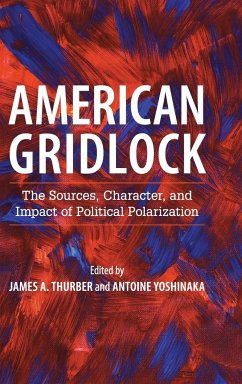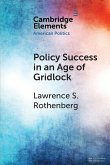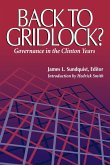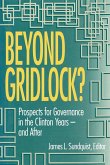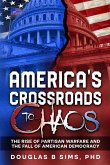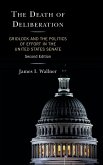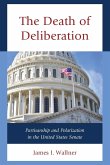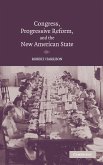American Gridlock
Herausgeber: Thurber, James A.; Yoshinaka, Antoine
American Gridlock
Herausgeber: Thurber, James A.; Yoshinaka, Antoine
- Gebundenes Buch
- Merkliste
- Auf die Merkliste
- Bewerten Bewerten
- Teilen
- Produkt teilen
- Produkterinnerung
- Produkterinnerung
American Gridlock is a comprehensive analysis of polarization encompassing national and state politics, voters, elites, activists, the media, and the three branches of government.
Andere Kunden interessierten sich auch für
![Policy Success in an Age of Gridlock Policy Success in an Age of Gridlock]() Lawrence S. RothenbergPolicy Success in an Age of Gridlock17,99 €
Lawrence S. RothenbergPolicy Success in an Age of Gridlock17,99 €![Back to Gridlock? Back to Gridlock?]() Back to Gridlock?24,99 €
Back to Gridlock?24,99 €![Beyond Gridlock? Beyond Gridlock?]() Beyond Gridlock?22,99 €
Beyond Gridlock?22,99 €![America's Crossroads to Chaos America's Crossroads to Chaos]() Douglas B SimsAmerica's Crossroads to Chaos13,99 €
Douglas B SimsAmerica's Crossroads to Chaos13,99 €![The Death of Deliberation The Death of Deliberation]() James I. WallnerThe Death of Deliberation120,99 €
James I. WallnerThe Death of Deliberation120,99 €![The Death of Deliberation The Death of Deliberation]() James I. WallnerThe Death of Deliberation61,99 €
James I. WallnerThe Death of Deliberation61,99 €![Congress, Progressive Reform, and the New American State Congress, Progressive Reform, and the New American State]() Robert HarrisonCongress, Progressive Reform, and the New American State104,99 €
Robert HarrisonCongress, Progressive Reform, and the New American State104,99 €-
-
-
American Gridlock is a comprehensive analysis of polarization encompassing national and state politics, voters, elites, activists, the media, and the three branches of government.
Hinweis: Dieser Artikel kann nur an eine deutsche Lieferadresse ausgeliefert werden.
Hinweis: Dieser Artikel kann nur an eine deutsche Lieferadresse ausgeliefert werden.
Produktdetails
- Produktdetails
- Verlag: Cambridge University Press
- Seitenzahl: 436
- Erscheinungstermin: 17. März 2016
- Englisch
- Abmessung: 235mm x 157mm x 30mm
- Gewicht: 854g
- ISBN-13: 9781107114166
- ISBN-10: 1107114160
- Artikelnr.: 43104132
- Herstellerkennzeichnung
- Libri GmbH
- Europaallee 1
- 36244 Bad Hersfeld
- gpsr@libri.de
- Verlag: Cambridge University Press
- Seitenzahl: 436
- Erscheinungstermin: 17. März 2016
- Englisch
- Abmessung: 235mm x 157mm x 30mm
- Gewicht: 854g
- ISBN-13: 9781107114166
- ISBN-10: 1107114160
- Artikelnr.: 43104132
- Herstellerkennzeichnung
- Libri GmbH
- Europaallee 1
- 36244 Bad Hersfeld
- gpsr@libri.de
Part I. Polarization among Voters and Activists: 1. The new American
electorate: partisan, sorted, and polarized Alan I. Abramowitz; 2.
Redistricting and polarization Micah Altman and Michael McDonald; 3. Party
activists, interest groups, and polarization in American politics David
Karol; 4. Authoritarianism and polarization in American politics, still?
Marc J. Hetherington and Jonathan Weiler; 5. Party sorting: the foundation
of polarized politics Samuel J. Abrams and Morris P. Fiorina; Part II.
Polarization in National Institutions: 6. Presidential-congressional
relations in an era of polarized parties and a sixty-vote Senate Jon R.
Bond, Richard Fleisher and Jeffrey E. Cohen; 7. Party warriors: the ugly
side of party polarization in Congress Sean M. Theriault; 8. The sources
and consequences of polarization in the US Supreme Court Brandon L.
Bartels; Part III. Polarization in the States: 9. Polarization in American
state legislatures Boris Shor; 10. The costs of party reform: two states'
experiences Seth E. Masket; 11. The policy consequences of party
polarization: evidence from the American States Elizabeth Rigby and Gerald
C. Wright; Part IV. Polarization in the Media: 12. Partisan media and
electoral polarization in 2012: evidence from the American National
Election Study Gary C. Jacobson; 13. News as a casualty: district
polarization and media coverage of US House campaigns Danny Hayes and
Jennifer L. Lawless; 14. More a symptom than a cause: polarization and
partisan news media in America Kevin Arceneaux and Martin Johnson; 15. The
polarizing effects of partisan and mainstream news Natalie Jomini Stroud
and Alexander Curry; Part V. Implications and Conclusions: 16.
Congressional polarization and its connection to income equality: an update
Adam Bonica, Nolan McCarty, Keith T. Poole and Howard Rosenthal; 17. The
sources and impact of political polarization James A. Thurber and Antoine
Yoshinaka.
electorate: partisan, sorted, and polarized Alan I. Abramowitz; 2.
Redistricting and polarization Micah Altman and Michael McDonald; 3. Party
activists, interest groups, and polarization in American politics David
Karol; 4. Authoritarianism and polarization in American politics, still?
Marc J. Hetherington and Jonathan Weiler; 5. Party sorting: the foundation
of polarized politics Samuel J. Abrams and Morris P. Fiorina; Part II.
Polarization in National Institutions: 6. Presidential-congressional
relations in an era of polarized parties and a sixty-vote Senate Jon R.
Bond, Richard Fleisher and Jeffrey E. Cohen; 7. Party warriors: the ugly
side of party polarization in Congress Sean M. Theriault; 8. The sources
and consequences of polarization in the US Supreme Court Brandon L.
Bartels; Part III. Polarization in the States: 9. Polarization in American
state legislatures Boris Shor; 10. The costs of party reform: two states'
experiences Seth E. Masket; 11. The policy consequences of party
polarization: evidence from the American States Elizabeth Rigby and Gerald
C. Wright; Part IV. Polarization in the Media: 12. Partisan media and
electoral polarization in 2012: evidence from the American National
Election Study Gary C. Jacobson; 13. News as a casualty: district
polarization and media coverage of US House campaigns Danny Hayes and
Jennifer L. Lawless; 14. More a symptom than a cause: polarization and
partisan news media in America Kevin Arceneaux and Martin Johnson; 15. The
polarizing effects of partisan and mainstream news Natalie Jomini Stroud
and Alexander Curry; Part V. Implications and Conclusions: 16.
Congressional polarization and its connection to income equality: an update
Adam Bonica, Nolan McCarty, Keith T. Poole and Howard Rosenthal; 17. The
sources and impact of political polarization James A. Thurber and Antoine
Yoshinaka.
Part I. Polarization among Voters and Activists: 1. The new American
electorate: partisan, sorted, and polarized Alan I. Abramowitz; 2.
Redistricting and polarization Micah Altman and Michael McDonald; 3. Party
activists, interest groups, and polarization in American politics David
Karol; 4. Authoritarianism and polarization in American politics, still?
Marc J. Hetherington and Jonathan Weiler; 5. Party sorting: the foundation
of polarized politics Samuel J. Abrams and Morris P. Fiorina; Part II.
Polarization in National Institutions: 6. Presidential-congressional
relations in an era of polarized parties and a sixty-vote Senate Jon R.
Bond, Richard Fleisher and Jeffrey E. Cohen; 7. Party warriors: the ugly
side of party polarization in Congress Sean M. Theriault; 8. The sources
and consequences of polarization in the US Supreme Court Brandon L.
Bartels; Part III. Polarization in the States: 9. Polarization in American
state legislatures Boris Shor; 10. The costs of party reform: two states'
experiences Seth E. Masket; 11. The policy consequences of party
polarization: evidence from the American States Elizabeth Rigby and Gerald
C. Wright; Part IV. Polarization in the Media: 12. Partisan media and
electoral polarization in 2012: evidence from the American National
Election Study Gary C. Jacobson; 13. News as a casualty: district
polarization and media coverage of US House campaigns Danny Hayes and
Jennifer L. Lawless; 14. More a symptom than a cause: polarization and
partisan news media in America Kevin Arceneaux and Martin Johnson; 15. The
polarizing effects of partisan and mainstream news Natalie Jomini Stroud
and Alexander Curry; Part V. Implications and Conclusions: 16.
Congressional polarization and its connection to income equality: an update
Adam Bonica, Nolan McCarty, Keith T. Poole and Howard Rosenthal; 17. The
sources and impact of political polarization James A. Thurber and Antoine
Yoshinaka.
electorate: partisan, sorted, and polarized Alan I. Abramowitz; 2.
Redistricting and polarization Micah Altman and Michael McDonald; 3. Party
activists, interest groups, and polarization in American politics David
Karol; 4. Authoritarianism and polarization in American politics, still?
Marc J. Hetherington and Jonathan Weiler; 5. Party sorting: the foundation
of polarized politics Samuel J. Abrams and Morris P. Fiorina; Part II.
Polarization in National Institutions: 6. Presidential-congressional
relations in an era of polarized parties and a sixty-vote Senate Jon R.
Bond, Richard Fleisher and Jeffrey E. Cohen; 7. Party warriors: the ugly
side of party polarization in Congress Sean M. Theriault; 8. The sources
and consequences of polarization in the US Supreme Court Brandon L.
Bartels; Part III. Polarization in the States: 9. Polarization in American
state legislatures Boris Shor; 10. The costs of party reform: two states'
experiences Seth E. Masket; 11. The policy consequences of party
polarization: evidence from the American States Elizabeth Rigby and Gerald
C. Wright; Part IV. Polarization in the Media: 12. Partisan media and
electoral polarization in 2012: evidence from the American National
Election Study Gary C. Jacobson; 13. News as a casualty: district
polarization and media coverage of US House campaigns Danny Hayes and
Jennifer L. Lawless; 14. More a symptom than a cause: polarization and
partisan news media in America Kevin Arceneaux and Martin Johnson; 15. The
polarizing effects of partisan and mainstream news Natalie Jomini Stroud
and Alexander Curry; Part V. Implications and Conclusions: 16.
Congressional polarization and its connection to income equality: an update
Adam Bonica, Nolan McCarty, Keith T. Poole and Howard Rosenthal; 17. The
sources and impact of political polarization James A. Thurber and Antoine
Yoshinaka.

